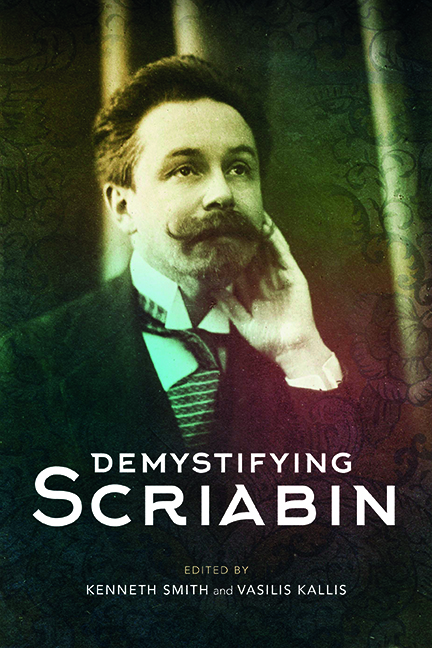16 - Scriabin’s Critical Reception: ‘Genius orMadman?’
Published online by Cambridge University Press: 07 October 2022
Summary
To think that Gloucester Cathedral should ever echo tosuch music! It's awonderthe gargoyles don't fall offthe tower’. So responded Elgar to the ‘outrage’ thatis Scriabin's Poeme del’extase. Few composers polarise opinionquite like Scriabin. The Scottish composer andcritic Cecil Gray declared: ‘We already havecocaine, morphine, hashish, heroin, anhalonium, andinnumerable similar productions, to say nothing ofalcohol, surely that is enough’. For others it is‘thematically impoverished, undistinguished stuff’,‘overripe’, ‘impenetrable’, ‘lacking in structure’,‘crude’, and ‘to some […] it is ‘erotic’: to othersit is less stimulating than a cold shower’.Favourable reactions are similarly vociferous.Critic and musician Arthur Eaglefield Hull(1876–1928) pronounced Scriabin the ‘great musicalgenius of Russia’, who produced music of ‘marvellousbeauty and spirituality’. More recently, commentsfrom popular Scriabin performances on YouTube referto the music as ‘indescribable […] amazinglyenchanting and mesmerizing’, ‘gorgeous’,‘otherworldly’, and ‘heavenly’. In my ownexperience, a love of Scriabin's music can border onobsession.
Excellent work has already been undertaken in the studyof Scriabin's reception in Russia and the USA, andfor that reason the following chapter primarilyaddresses the response to Scriabin's music inEngland up to the present day, with particular focusgiven to works from Op. 53 onwards. I explore thereasons for the above reactions, considering issuesof harmony, philosophy, and portrayals of Scriabin'smental state. I discuss the implications of all theabove for contemporary performance practice,reflecting on what we may learn to ensure a brightfuture for Scriabin performance.
Scriabin as Pianist-Composer
Scriabin possessed a unique pianism. His delicatetouch, poetic sense of nuance, sophisticatedpedalling, and imaginative rubato earned admirationfrom audiences and critics. His student YelenaBekman-Shcherbina characterised his playing aspossessing ‘an amazing finesse on nuances. Thenotation could not convey all the shadings,capricious tempo fluctuations, and the right tone’.Scriabin was glowingly remembered in the Londonpress in 1915 as having delighted ‘his listeners bythe delicacy and poetic imaginativeness of hisinterpretations. His sense of nuance was soremarkable that it is scarcely to be hoped that hispiano works can ever again be heard under suchperfect conditions’.
- Type
- Chapter
- Information
- Demystifying Scriabin , pp. 302 - 320Publisher: Boydell & BrewerPrint publication year: 2022



